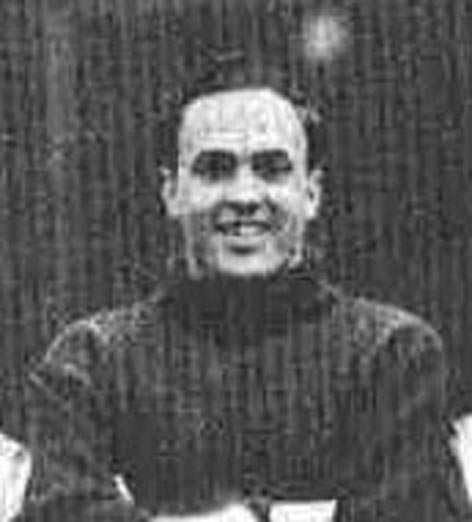

Searson: Harold Vincent (Harry/Polly)
1949-1952
(Player Details)
Goalkeeper
Born: Mansfield: 03-06-1924
Debut v Coventry City (a): 15-01-1949
6’1” 12st 7lb (1949)
Searson was educated at High Oakham School and played for Mansfield and Nottinghamshire
Schools and North Notts League side, Bilsthorpe Colliery, who he joined in 1941, before
serving with the Fleet Air Arm in India. In 1942 he joined Sheffield Wednesday as an amateur,
turning professional in August 1946 on return from his service in India. As the Owls had six
goalkeepers on their books at the time, he did not feature in the Owls senior team and he
returned to his native town and joined Mansfield Town in June 1947. He signed as a part-time
professional and resumed his former trade of electrician. He played forty-two times for them
before he was transferred to Leeds for £2,000 on 13th January 1949. Thanks to David McAdam and
Thirkers the events of the day he made his Leeds United debut are recorded on this site. It
shows the Team boarding the Coach at Elland Road
for the trip to Coventry City on 15th January 1949 and the team
without Searson but with Tom Peters on their journey southward. Tom Peters had signed for
Mansfield Town and the club gave him a lift there, with Searson joining the party as Peters
reached his destination. Now the Leeds team complete with their goalkeeper continued
the journey to Highfield Road and this is the team that played that day in a 1-4 defeat.
‘Polly’ Searson earned a reputation for long
kicking and an ability to onfidently gather high centres during his days with Leeds. United had
found it hard to stop conceding goals in the years after football resumed after the Second World
War as Jim Twomey was well into his thirties and Harry Fearnley did not seem to be the answer.
Major Frank Buckley saw Searson as the man to stem the flow of goals conceded and so it proved.
After a settling in period he became an ever-present, playing almost eighty games consecutively
from January 1949 to October 1950 and was the rock on which the uncompromising Leeds defence was
built on during their epic performances in the Cup and League in the second half of the 1949-50
season. He famously had a good luck charm in the form of a mascot doll named ‘Lulu’ which he
carried onto the pitch with him each game and placed it in the net throughout the game. It was
a feature of United’s 1949-50 run of victories but it had more to do with John Charles and the
Leeds defence than any good luck charm. He saw the emergence of the Welsh Giant and but could
see his potential even then as he expressed his delight at the end of his first season with the
club, just before the start of the 1949-50 season. "Now I would not be with any other club. They
have treated me very well. I like it here." He said he hoped soon to resume his trade. Like all
goalkeepers Searson sees a lot of his centre-half. "John Charles is a grand lad and when he has
the experience of Tom Holley he will be outstanding. Tom is just about the ideal centre-half to
play behind. You know with him that if the ball comes through the centre forward will not come
with it. If the centre forward comes through the ball will stay behind. I like it either way,
but not both." His foresight was apt as Leeds, after looking like relegation candidates in the
first two months of the campaign, recovered and went on a brilliant run in the League and reach
the quarter-finals before succumbing 0-1 to Arsenal at Highbury. In the League they finished
sixth and humbled run away Champions of the Second Division, Tottenham Hotspur 3-0 at Elland
Road, with a display that few supporters ever saw bettered. An ever-present that season, he was
one of the main reasons for the club's successful season. There was a rivalry with Jack Scott
which started in the 1950-51 season and carried on through the 1951-52 season which saw first
one and then the other in the last line of defence, before Scott finally wrested the spot in
the last two months of the 1951-52 season. During his time with Leeds Searson was football
coach to the Hunslet Boys’ Club and a noted club cricketer. When Scott had established himself,
Searson accepted the inevitable and joined York City in November 1952. The Minstermen signed
Searson as a replacement for Des Thompson. He proved a capable replacement. He stayed at York
until 1954 and made sixty-two appearances, before he joined Corby Town in June of that year.
He was also one of the few post-war players to play on his wedding day and after retirement
continued to live in Corby, Northamptonshire. It was there that he died on 5th January 2013,
after a battle with cancer